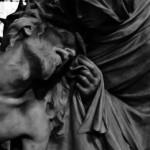We run our website the way we wished the whole internet worked: we provide high quality original content with no ads. We are funded solely by your direct support. Please consider supporting this project.
Do We Read Bible-Violence to Children? (podcast)
Greg on children and Bible violence.
Episode 658

Send Questions To:
Dan: @thatdankent
Email: askgregboyd@gmail.com
Twitter: @reKnewOrg
Greg’s new book: Inspired Imperfection
Dan’s new book: Confident Humility
Subscribe:
Category: ReKnew Podcast
Tags: Crucifixion of the Warrior God, Cruciform Theology, Hermeneutics, Kids
Related Reading

The ReKnew Cross Vision Conference is Coming!
Since its release in mid-April, Crucifixion of the Warrior God has helped a multitude of people fully embrace for the first time the beautiful God revealed in Jesus’ cross-centered life and ministry. It has helped many others regain their confidence in the Bible as “God’s inspired word,” despite its many ugly, violent depictions of God.…

A Foolish and Weak-Looking God
The New Testament assumes that the God of Israel and the God revealed in Jesus Christ are one and the same God. But there also can be no question that the portrait of God that was unveiled when the Messiah arrived on the scene was in some respects quite different from what the OT had…

The REAL Problem with Divine Violence in the OT
As I mentioned in my previous blog, while I will continue to offer video-blogs responding to questions that come in, I’m also planning on sprinkling in reflections based on my forthcoming book, Crucifixion of the Warrior God, over the next couple months. Today, I just want to state what I consider to be the real…

Podcast: HOW Does the Death of Jesus Allow Us to Be Forgiven?
Greg discusses love bombs and explosions of light. http://traffic.libsyn.com/askgregboyd/Episode_0419.mp3

Was the Early Church Pacifistic? A Response to Paul Copan (#11)
In Crucifixion of the Warrior God (CWG) I argue that Jesus and Paul instruct Christians to love and bless their enemies and to unconditionally refrain from violence (e.g. Matt 5:39-45; Rom 12:14-21). Moreover, I argue that this was the prevailing attitude of Christians prior to the fourth century when the Church aligned itself with the…

Podcast: How Does the Story of Achan In Joshua 7 Point to the Cross?
Greg looks at a violent Old Testament story through a Cruciform lens. http://traffic.libsyn.com/askgregboyd/Episode_0447.mp3



